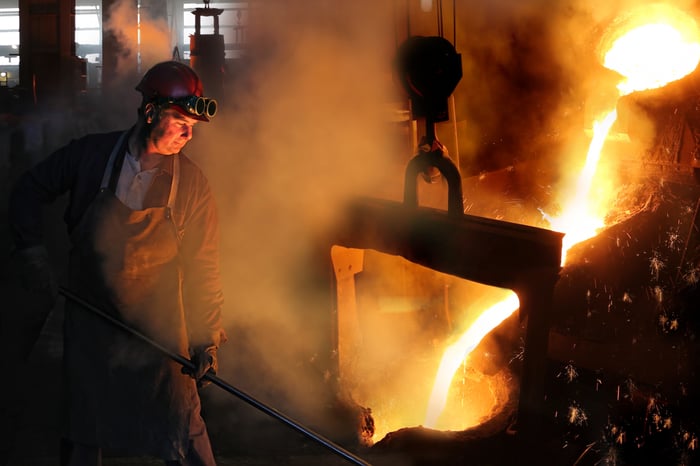It's not easy to grow a business, let alone one that operates in a mature industry with a focus on a slow-growth economy. This, however, is the situation facing Nucor Corporation (NUE -0.22%), one of the largest U.S. steel companies. To put it bluntly, Nucor is always facing a market with little room for growth. But it has plans to grow just the same.
Here are three things Nucor is working on now to keep its industry-leading steel business growing for the long term.
1. Take market share
Electric-arc furnaces and scrap metal are the core of Nucor's business. That generally gives it a cost advantage over competitors like AK Steel and United States Steel Corporation that use older blast-furnace technology. But Nucor isn't the only company that uses electric-arc technology, so it has to compete against peers with the same production approach and technology advantages.

Image source: Getty Images.
One of the key moves it is making today to grow is a matter of simple physics. Steel is heavy, and costly to ship from where it is produced to where it is used. To take advantage of this dynamic, Nucor currently has plans to build rebar mills in Missouri and Florida -- areas currently being served largely by competitors trucking in steel from other markets -- for a total cost of nearly $500 million. The mills will start up in 2019 and 2020, respectively.
Nucor believes building these mills will give it a logistics advantage compared to peers. However, Nucor's scrap metal business, The David J. Joseph Company, also has a large presence in these areas; that gives it an advantage on its own production costs, as well. It is, effectively, looking to take share from competitors with well-located mills that have relatively low input costs.
2. Enter new sectors
Another way for Nucor to expand is by branching out into additional steel niches. The most obvious example of this recently was the trio of acquisitions the company made in late 2016 and early 2017. It spent roughly $900 million to buy three tubular steel companies that formed the basis of a new division.
There was more to this swift and fairly aggressive expansion than just entering the tubular steel market. Tubular steel is a higher-margin product that moves the company up the value chain, one of management's key priorities. This new division allows Nucor to take commodity steel from its own mills and put it to work in its own plants. After taking commodity flat-rolled steel and turning it into specialized tubular steel, it gets to sell the now upgraded product at higher prices.
Although this is a relatively new unit, Nucor's results have been very strong. In fact, during the company's second-quarter conference call, CEO John Ferriola described the division's results as "outstanding." At this point, Nucor believes that tubular steel production could grow as much as 33% in 2018, year over year. By making moves like this across its business, Nucor has increased its downstream use of steel from 8% of production in 2006 to 19% in 2017.
This investment is still playing out, but it isn't the only new market Nucor is working on. It has also been pushing into the auto market, which brings up growth plan No. 3.
3. Reach into adjacent countries
Nucor's primary market is the United States, but it has recently been inching more and more into neighboring Canada and Mexico. In Mexico, the company is working with Japanese partner JFE Steel on a 50-50 joint venture to build a galvanized-steel sheet mill intended to serve the Mexican auto market. Nucor will pay half of the $270 million construction cost, and provide half of the raw materials to the mill. The new mill is expected to be completed in mid- to late 2019.
This mill pulls several growth levers. First, it expands Nucor's business geographically into Mexico. Second, it allows the steel giant to expand its reach in the auto sector. And third, it provides another opportunity for Nucor to take commodity steel it produces and move it up the value chain to be sold at a higher margin.
Just a few examples
Stepping back from these specific growth efforts, it is important to note that they aren't the only moves that Nucor is making today. It has several more ground-up construction projects and mill expansions underway, and is (as noted) reaching into the Canadian market. What the examples above really highlight are the methods this giant U.S. mill is using to keep growing, despite operating in a largely mature market.
There's no question that growth is hard to come by in the highly competitive domestic steel sector, suggesting that Nucor is running out of room to grow its business. But Nucor clearly isn't sitting still -- it continues to find new ways to expand.
Nucor isn't cheap today, but if you are looking to buy shares of a steelmaker, this well-run company should at least be on your wishlist.





